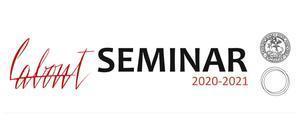Labont online seminar 2020-2021
Nadia Urbinati, Democracy and political conflict | 19 luglio 2021 alle 16

Il Labont Seminar 2020-21 si tiene online, a lunedì alternati, dalle 16 alle 18
L’archivio dei seminari è consultabile sul canale YouTube di Labont
The acronym “OOO” – short for “Object-Oriented Ontology” – refers to a contemporary form of philosophical realism dedicated to the exploration of the intrinsic being of “objects” broadly understood. As its founder Graham Harman frequently clarifies, OOO gives the term “object” an especially broad scope, taking it to refer to whatever is ontologically irreducible. In other words, within this specific framework, anything may be said to be an object as long as it cannot be reduced downward (“undermined”) into nothing more than its ultimate component pieces (e.g. “physicalism” and “smallism”), or reduced upward (“overmined”) into nothing more than its relations and effects on humans or other objects (e.g. “anti-fictionalism” and “literalism”). Relative to this, it may then be noted that Harman’s ultimate qualm with “undermining” specifically is the fact that it is unable to deal with the question of emergence. In other words, if, underminers were right to insist that particular entities are nothing but their ultimate component pre-individual parts, then it would be difficult at best (or impossible at worst) for them to explain how the latter go on to develop into highly specific individual entities. Such a qualm must in turn necessitate an inquiry into Harman’s specific understanding of the term “emergence” given its loaded meaning, and historical susceptibility to mystical connotations. In view of this, my talk shall focus on the semantics of this particular term and its consequences for Harman’s specific variety of OOO, namely “Object-Oriented Philosophy” (OOP).
In line with Kant’s Critique of the Power of Judgment, aesthetic experience is often regarded as subjective. This, however, is not compatible with the very existence of artworks as objects that, when experienced, per se effect an aesthetic attitude. Artworks as such withdraw from conceptual determination and thus draw attention to their mere perceptibility. They are made for intensified perceptive experience, which normally is called “aesthetic”. Considering the structure of artworks I will first attempt to clarify this more in detail.
Subsequently I wish to show that intensified perceptive experience as enabled by artworks is a discovery of the primordial perceptibility that grounds everyday life as well as scientific research, but remains implicit or is marginalized with every meaning-dominated and conceptual practice.
Thus art gives access to the original character of the “life world” in terms of Husserl’s phenomenology. However, art and its aesthetic experience thereby do not reveal a particular truth that otherwise remains concealed. Art rather complements science, and it does so in a way similar to scientific practice.
As I intend to show in reference to Valéry’s reflections on Leonardo da Vinci and also to Husserl’ considerations on the origin of geometry, art performs an abstraction from the world of meaningful entities in order to reveal the purely perceptible, whereas science performs a similar abstraction, but in order to establish a formal system, which allows a mathematical determination of things. Such determination really is a cognition, and not construction. Both art and science are objective in a contrary, but complementary way.
What might we mean by unconscious information? Building off my earlier analysis in the fifth chapter of my book, Documentarity: Evidence, Ontology, and Inscription (MIT Press, 2019), I will discuss this concept in terms of trauma theory, particularly the causal-temporal forms of explanation in such.
Human agency is constituted by reasons. Behavior is action, if guided by reasons. But how are we to conceive the Effect of Reasons? And how is this compatible with our scientific world view? I shall discuss three characteristics of reasons: normativity , objectivity, and non-algorithmicity. Social facts play an important role for practical reasons and although they are only constituted by social practices, they are objective, what implies their realistic interpretation. This leads to the question how theoretical and practical reasons relate. I shall end with a discussion of the (metaphysical) status of reasons.
The theme of political parties is a chapter in the theory of government and political freedom, although democratic theory has traditionally been silent on parties or has approached them as necessary evil. This paper intends to reclaim the normative and functional meaning of political party in representative democracy by showing how it connects to representative democracy and political freedom. It makes this claim by revisiting the ideas of two seminal authors, Carl Schmitt and Hans Kelsen, and reads their work exclusively in relation to political parties and party pluralism, topics it treats as the mirror of their respective conceptions of the state and parliamentary government, and ultimately as a test of the role of political conflict in democracy. The place of political party in the conception of the state and democracy allows us to detect two paradigms of sovereignty depending on whether the party has been approached from the angle of the state or that of citizens, of authority or of freedom. The paper sketches these two lines of interpretation through a selective reading of Schmitt’s and Kelsen’s works in relation to political party in the years of the Weimar republic’s construction. The analysis of the ideas of these two authors proves that the party is more than a pragmatic tool. Like a kaleidoscope, it brings an array of conceptions of politics and the state to the floor and shows to be central in the making of democracy.
Gli incontri sono pubblici, danno crediti per i dottorandi FINO del curriculum teoretico e si terranno su Webex
Per informazioni, potete di scrivere a francesco.camboni@unito.it o a fausto.corvino@unito.it




